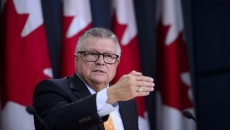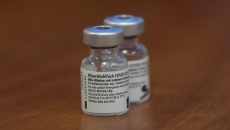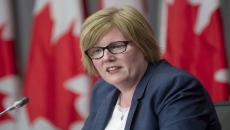Reforms to a federal support program for provinces will nearly triple the cost to Ottawa next year, with the price tag projected to be about $4.5 billion, says Canada's parliamentary budget officer.
Yves Giroux says the government's fiscal stabilization program, which transfers cash to provinces that experience steep year-over-year revenue drops, will increase by $2.9 billion in fiscal 2021-22.
Prime Minister Justin Trudeau announced a major change to the program in the government's fall economic update.
The revenue-insurance plan will lift funding capped for more than three decades at $60 per resident to $170, indexing the payment ceiling to Canada’s rate of GDP growth per person.
Alberta Premier Jason Kenney has said the overhaul does not go far enough, calling it a "slap in the face," since even major declines in resource revenue might not trigger the fiscal stabilization, while a five per cent drop in non-resource revenue will.
The program only kicks in for resource income when decreases exceed 50 per cent.
The beefed-up federal support comes as provinces wobble under the strain of record deficits and revenue shortfalls due to the COVID-19 pandemic and related restrictions.
Several provincial ministers expressed disappointment the Liberals didn't eliminate the funding cap as they had asked.
Alberta Finance Minister Travis Toews said last month his province expected to receive $750 million under the new limits, a figure that falls well short of what Alberta could use.
Newfoundland and Labrador's Finance Minister Siobhan Coady has said that her province's projected 45 per cent drop in offshore oil revenues this year would not allow it to qualify for help through the stabilization fund.
Provinces are also allowed to apply for an interest-free loan under the program, though none has requested one since 1987, the budget office says.
The program dates back to 1967, brought in under Lester Pearson's Liberal government to help cushion the blow to provinces going through economic rough patches.






